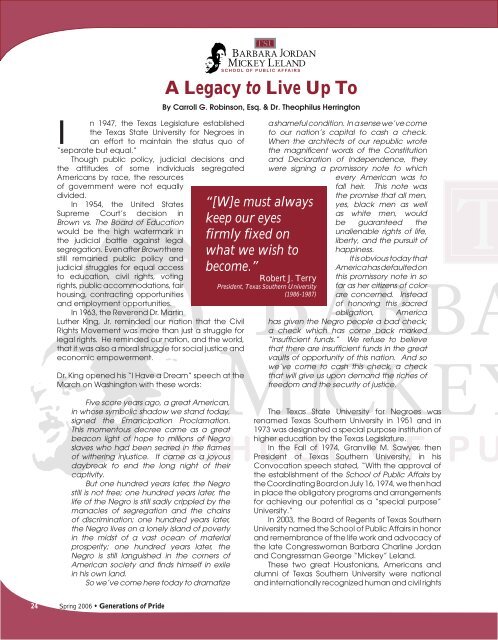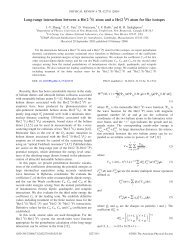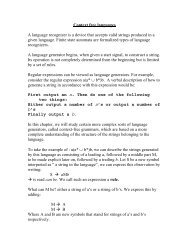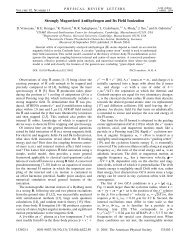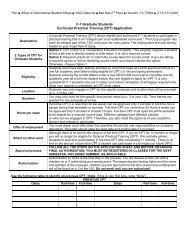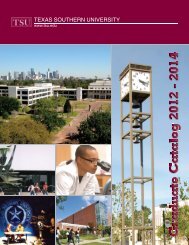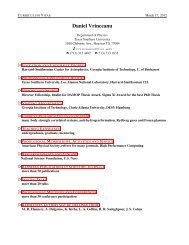Generations of Pride - Texas Southern University
Generations of Pride - Texas Southern University
Generations of Pride - Texas Southern University
- No tags were found...
You also want an ePaper? Increase the reach of your titles
YUMPU automatically turns print PDFs into web optimized ePapers that Google loves.
In 1947, the <strong>Texas</strong> Legislature establishedthe <strong>Texas</strong> State <strong>University</strong> for Negroes inan effort to maintain the status quo <strong>of</strong>“separate but equal.”Though public policy, judicial decisions andthe attitudes <strong>of</strong> some individuals segregatedAmericans by race, the resources<strong>of</strong> government were not equallydivided.In 1954, the United StatesSupreme Court’s decision inBrown vs. The Board <strong>of</strong> Educationwould be the high watermark inthe judicial battle against legalsegregation. Even after Brown therestill remained public policy andjudicial struggles for equal accessto education, civil rights, votingrights, public accommodations, fairhousing, contracting opportunitiesand employment opportunities.In 1963, the Reverend Dr. MartinLuther King, Jr. reminded our nation that the CivilRights Movement was more than just a struggle forlegal rights. He reminded our nation, and the world,that it was also a moral struggle for social justice andeconomic empowerment.Dr. King opened his “I Have a Dream” speech at theMarch on Washington with these words:A Legacy to Live Up ToBy Carroll G. Robinson, Esq. & Dr. Theophilus Herrington“[W]e must alwayskeep our eyesfirmly fixed onwhat we wish tobecome.”Robert J. TerryPresident, <strong>Texas</strong> <strong>Southern</strong> <strong>University</strong>(1986-1987)a shameful condition. In a sense we’ve cometo our nation’s capital to cash a check.When the architects <strong>of</strong> our republic wrotethe magnifi cent words <strong>of</strong> the Constitutionand Declaration <strong>of</strong> Independence, theywere signing a promissory note to whichevery American was t<strong>of</strong>all heir. This note wasthe promise that all men,yes, black men as wellas white men, wouldbe guaranteed theunalienable rights <strong>of</strong> life,liberty, and the pursuit <strong>of</strong>happiness.It is obvious today thatAmerica has defaulted onthis promissory note in s<strong>of</strong>ar as her citizens <strong>of</strong> colorare concerned. Instead<strong>of</strong> honoring this sacredobligation, Americahas given the Negro people a bad check;a check which has come back marked“insuffi cient funds.” We refuse to believethat there are insuffi cient funds in the greatvaults <strong>of</strong> opportunity <strong>of</strong> this nation. And sowe’ve come to cash this check, a checkthat will give us upon demand the riches <strong>of</strong>freedom and the security <strong>of</strong> justice.Five score years ago, a great American,in whose symbolic shadow we stand today,signed the Emancipation Proclamation.This momentous decree came as a greatbeacon light <strong>of</strong> hope to millions <strong>of</strong> Negroslaves who had been seared in the fl ames<strong>of</strong> withering injustice. It came as a joyousdaybreak to end the long night <strong>of</strong> theircaptivity.But one hundred years later, the Negrostill is not free; one hundred years later, thelife <strong>of</strong> the Negro is still sadly crippled by themanacles <strong>of</strong> segregation and the chains<strong>of</strong> discrimination; one hundred years later,the Negro lives on a lonely island <strong>of</strong> povertyin the midst <strong>of</strong> a vast ocean <strong>of</strong> materialprosperity; one hundred years later, theNegro is still languished in the corners <strong>of</strong>American society and fi nds himself in exilein his own land.So we’ve come here today to dramatizeThe <strong>Texas</strong> State <strong>University</strong> for Negroes wasrenamed <strong>Texas</strong> <strong>Southern</strong> <strong>University</strong> in 1951 and in1973 was designated a special purpose institution <strong>of</strong>higher education by the <strong>Texas</strong> Legislature.In the Fall <strong>of</strong> 1974, Granville M. Sawyer, thenPresident <strong>of</strong> <strong>Texas</strong> <strong>Southern</strong> <strong>University</strong>, in hisConvocation speech stated, “With the approval <strong>of</strong>the establishment <strong>of</strong> the School <strong>of</strong> Public Affairs bythe Coordinating Board on July 16, 1974, we then hadin place the obligatory programs and arrangementsfor achieving our potential as a “special purpose”<strong>University</strong>.”In 2003, the Board <strong>of</strong> Regents <strong>of</strong> <strong>Texas</strong> <strong>Southern</strong><strong>University</strong> named the School <strong>of</strong> Public Affairs in honorand remembrance <strong>of</strong> the life work and advocacy <strong>of</strong>the late Congresswoman Barbara Charline Jordanand Congressman George “Mickey” Leland.These two great Houstonians, Americans andalumni <strong>of</strong> <strong>Texas</strong> <strong>Southern</strong> <strong>University</strong> were nationaland internationally recognized human and civil rights24 Spring 2006 • <strong>Generations</strong> <strong>of</strong> <strong>Pride</strong>


